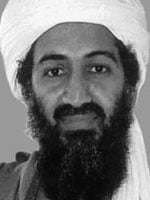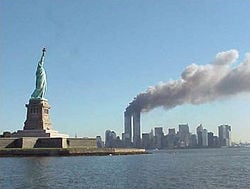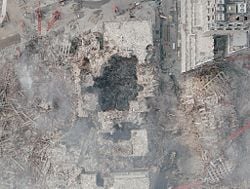Osama bin Laden
| Osama bin Laden | |
|---|---|
| March 10, 1957 - May 2, 2011 | |
 Osama bin Laden from the FBI's "Ten Most Wanted" list | |
| Place of birth | Riyadh, Saudi Arabia |
| Place of death | Abbottābad, Pakistan |
| Battles/wars | Afghan Jihad 1998 U.S. embassy bombings 2001 World Trade Center bombings War on Terrorism |
Osama bin Laden (Arabic: أسامة بن محمد بن عوض بن لادن) (March 10, 1957 - May 2, 2011) was a founder of the militant Islamist al-Qaeda movement, best known for masterminding the September 11, 2001 attacks on the United States. A member of the prominent bin Laden family of Saudi Arabia, Osama used his personal wealth to fund the development of al-Qaeda and has been associated with numerous mass-casualty attacks against civilian targets.
Bin Laden's name is transliterated in several ways. Most English-language mass media use Osama bin Laden. However, most U.S. government agencies use either "Usama bin Laden" or "Usama bin Ladin," both of which are abbreviated to UBL.
Educated as a civil engineer, bin Laden joined the fight against the Soviet occupation of Afghanistan in 1979. There, he met the Egyptian Islamic fundamentalist leader Ayman al-Zawahiri and expanded his focus in an attempt to rid the entire Middle East of non-Islamic influences, beginning his career as a terrorist in 1992 with the bombing of the Gold Mihor Hotel in Aden. Together with his al-Qaeda associates, he supported the Taliban regime in Afghanistan and carried out numerous attacks on civilian targets throughout the world in the late 1990s, culminating in the infamous attacks of September 11, 2001, in the United States.
Bin Laden and his organization were major targets of the United States' War on Terrorism. As of early 2009, he was believed to be still hiding in the border region between Afghanistan and Pakistan. However, on May 2, 2011, bin Laden was shot and killed inside a secured private residential compound in Abbottabad, Pakistan, by U.S. Navy SEALs in a covert operation authorized by U.S. President Barack Obama.
Childhood, education, and marriages
Osama bin Laden was born in Riyadh, Saudi Arabia, on March 10, 1957. His father, Muhammed Awad bin Laden, was a wealthy businessman with close ties to the Saudi royal family. One of more than 50 children, he was the only son of Muhammed bin Laden's tenth wife, Hamida al-Attas. Osama's parents divorced soon after he was born, and his mother then married Muhammad al-Attas, who worked at the bin Laden company. The couple had four other children, and Osama lived in the new household with three stepbrothers and one stepsister.
Raised as a devout Sunni Muslim, Osama studied economics and business administration at King Abdulaziz University, where he received a degree in civil engineering. However, at university, bin Laden's main interest seems to have been religion.
In 1974, at the age of 17, he married his first wife, Najwa Ghanem, at Latakia (Laodicea), Turkey. By 2002, bin Laden had married four women and fathered over 20 children.
Teachings
An adherent of the fundamentalist school of Salafism, bin Laden taught that Islam was perfect and complete during the days of Muhammad and his companions, but that undesirable innovations have been added over the later centuries due to materialist and cultural influences. Salafism claims to seek a practice of Islam that more closely resembles the religion during the time of Muhammad. Like many Islamists, bin Laden emphasized that only the restoration of Sharia law will set things right in the Muslim world. He rejected all other ideologies—"pan-Arabism, socialism, communism, democracy"—must be opposed.
Bin Laden consistently dwelt on the need for external jihad (holy war) to right what he believed were injustices against Muslims perpetrated by the United States and other non-Muslim states. He also called for the elimination of the State of Israel and the necessity of forcing the U.S. to withdraw from the Middle East. During the 1990s, he began to teach publicly that his native Saudi Arabia—the site of Islam's holy cities of Mecca and Medina—had been corrupted by American influences and was guilty of serious crimes against Islam. He insisted that Afghanistan, under the rule of Mullah Omar's Taliban, was "the only Islamic country" in the world.
The most controversial part of bin Laden's ideology is his doctrine that civilians, including women and children, can be killed in jihad.[1] He also delivered warnings against alleged Jewish conspiracies: "These Jews are masters of usury and leaders in treachery," he claims. "They will leave you nothing, either in this world or the next."[2] Bin Laden also opposed music on religious grounds.[3] He called on Americans to "reject the immoral acts of fornication (and) homosexuality, intoxicants, gambling, and usury."
Bin Laden also listed Shi'a Muslims as "heretics" and one of the principal "enemies of Islam."[4] This is one of the reasons that he encouraged al-Qaeda to put a major effort into undermining the new government of Iraq, which emerged as a Shia-led coalition after the demise of the Sunni-dominated Saddam Hussein regime.
Militant activity
Mujahideen in Afghanistan
After leaving college in 1979, bin Laden joined militant Palestinian scholar Abdullah Azzam to fight the Soviet invasion of Afghanistan and lived for a time in Peshawar. By 1984, with Azzam, bin Laden established the Maktab al-Khadamat, known in English as the Afghan Services Bureau, which funneled money, arms and Muslim fighters from around the Arab world into the Afghan war. Bin Laden's inherited family fortune and yearly income paid for travel, accommodations and administrative expenses of the Afghan fighters.

During this time bin Laden met his future al-Qaeda collaborator, the Egyptian militant Ayman al-Zawahiri. Osama then established an operational and training camp in Afghanistan, and fought against the Soviets. By 1988, at al-Zawahiri's urging, bin Laden had split from Maktab al-Khidamat and Azzam, determined to take a more directly military role in the struggle and insisting that Arab fighters form separate units rather than being integrated into native Afghan Taliban forces.[5]
After the defeat of the Soviets, bin Laden returned to Saudi Arabia in 1990 as a hero of jihad. However, his militancy soon alienated him from the Saudi elites. When Iraq invaded Kuwait, bin Laden met Crown Prince Sultan and urged him not to cooperate with coalition forces opposed to Saddam Hussein, offering to use his resources to help defend Saudi Arabia from any Iraqi aggression. When he was rebuffed, bin Laden publicly and bitterly denounced Saudi Arabia's dependence on the U.S. military, declaring that the Saudis had sinned against Islam.
Sudan
Bin Laden moved to Sudan in 1992, and established a new base for operations in Khartoum. Due to his continuous verbal assaults on King Fahd of Saudi Arabia, in 1994, Fahd sent an emissary to Sudan demanding bin Laden's passport. The bin Laden family was persuaded to cut off his monthly stipend, thought to amount to $7 million a year. By now bin Laden was strongly associated with Egyptian Islamic Jihad (EIJ), which made up the core of al-Qaeda. In 1995, the EIJ attempted to assassinate Egyptian President Hosni Mubarak. The attempt failed, and the EIJ was expelled from Sudan.
In late 1995, Sudanese officials discussed with the Saudi government the possibility of deporting bin Laden to Saudi Arabia, but the Saudis, who had revoked his citizenship, refused. In May 1996, with Sudan under increasing pressure from Saudi Arabia, Egypt, and the United States, bin Laden returned to Afghanistan and forged a close relationship with Taliban leader Mullah Mohammed Omar.
Early terrorist attacks
It is believed that the first terrorist attack involving bin Laden was the December 29, 1992 bombing of the Gold Mihor Hotel in Aden in which two people were killed.[6] It was after this attack that al-Qaeda began to develop its justification for the killing of innocent people. According to a fatwa—issued to al-Qaeda members but not the general public—by al Qaeda co-founder Mamdouh Mahmud Salim, the killing of someone "standing near" the enemy is justified because any innocent bystanders will find their just reward in death, going to Paradise if they were true Muslims and going to hell if they were bad Muslims or infidels.[7]
In the 1990s, with bin Laden's money, al-Qaeda assisted jihadists financially and militarily in Algeria, Egypt, and Afghanistan. In 1992 or 1993, bin Laden sent an emissary, Qari el-Said, with $40,000 to Algeria to aid Islamists there, urging armed struggle rather than negotiation with the government. The advice was heeded, but the civil war that followed killed 150,000-200,000 Algerians and ended with Islamist forces surrendering to the government. Another attack funded by bin Laden was the Luxor massacre of November 17, 1997, in Egypt, which killed 62 civilians. This action disgusted the Egyptian public and turned it against bin Laden and his philosophy of Islamist terror.
In mid-1997, the anti-Taliban Northern Alliance threatened to overrun Jalalabad, causing bin Laden to abandon his compound in Nazim Jihad and move his operations to Tarnak Farms in the south. In 1998, Bin Laden helped cement his alliance with his Taliban hosts by sending several hundred of his Arab fighters to help the Taliban in an infamous attack on the city of Mazar-e-Sharif. More than 8,000 non-combatants were reported killed, many of them through systematic slaughter, in Mazar-i-Sharif and later in Bamiyan.
In the same year, bin Laden and Ayman al-Zawahiri co-signed a fatwa in the name of the World Islamic Front for Jihad Against Jews and Crusaders, declaring that the killing of Americans and their allies was an "individual duty for every Muslim." At the public announcement of the fatwa, bin Laden announced that Americans are "very easy targets," boasting to attending journalists that, "You will see the results of this in a very short time."[8]
Criminal charges
On March 16, 1998, Libya issued the first official international Interpol arrest warrant against bin Laden and three other people for killing two German citizens in Libya on March 10, 1994, one of whom is thought to have been a German counter-intelligence officer. Bin Laden was first indicted by the United States on June 8, 1998, when a grand jury charged him with killing five Americans and two Indians in the November 14, 1995 truck bombing of a U.S.-operated Saudi National Guard training center in Riyadh. He was charged with "conspiracy to attack defense utilities of the United States," with being the head of the terrorist organization al-Qaeda, and with being a major financial backer of Islamic terrorists worldwide. Bin Laden denied involvement but praised the attack.
On November 4, 1998, after the U.S. embassy bombings in Kenya and Tanzania, bin Laden was indicted by a federal grand jury in the United States District Court for the Southern District of New York on charges of murdering U.S. nationals outside the U.S., conspiracy, and attacks on a federal facility resulting in death. The evidence against bin Laden included courtroom testimony by former al-Qaeda members and satellite phone records. Bin Laden first appeared on the Federal Bureau of Investigation's Ten Most Wanted Fugitives list on June 7, 1999, following his indictment for capital crimes in the 1998 embassy attacks.
In 1999, U.S. President Bill Clinton convinced the United Nations to impose sanctions against Afghanistan in an unsuccessful attempt to force the Taliban regime to extradite him.
September 11 attacks
The Federal Bureau of Investigation has stated that evidence linking al-Qaeda and bin Laden to the attacks of September 11, 2001, is clear and irrefutable, and bin Laden himself has claimed responsibility for the attacks. The attacks involved the hijacking of United Airlines Flight 93, United Airlines Flight 175, American Airlines Flight 11, and American Airlines Flight 77; the subsequent destruction of those planes and the twin towers of the World Trade Center in New York City, New York; severe damage to The Pentagon in Arlington, Virginia; and the deaths of at least 2,974 people, excluding the nineteen hijackers. In response to the attacks, the United States demanded that the Taliban withdraw its protection of bin Laden and his terrorist training camps in Afghanistan and launched a War on Terrorism to depose the Taliban regime in Afghanistan when the government refused to cooperate in the capture of bin Laden and other al-Qaeda operatives.
However, bin Laden initially denied involvement in the September 11, 2001 attacks. On September 16, 2001, he read a statement later broadcast by Qatar's Al Jazeera satellite channel denying responsibility for the attack. Then, in a videotape recovered by U.S. forces in November 2001, in Jalalabad, bin Laden was seen discussing the attack with Khaled al-Harbi in a way indicating foreknowledge. The tape was broadcast on various news networks on December 13, 2001. In a 2004 video, bin Laden abandoned his denials without retracting past statements, boasting that he had personally directed the 19 hijackers.[9] In the video, bin Laden claimed he was inspired to attack the World Trade Center after watching the destruction of towers in Lebanon by Israel during the 1982 Lebanon War. In two other tapes aired by Al Jazeera in 2006, Osama bin Laden also claimed credit for the attacks.
Fugitive
Immediately after the 9/11 attacks, US government officials named bin Laden and the al-Qaeda organization as the prime suspects and offered a reward of $25 million for information leading to his capture or death. U.S. military officials believe that bin Laden was present during the Battle of Tora Bora, Afghanistan in late 2001, but was able to escape.
Bin Laden and the al-Qaeda leadership were believed to be based in the Waziristan region of Pakistan in 2005. In 2007, Al Qaeda issued a video of bin Laden in which his beard was noticeably shorter than in previous videos. In January 2009, an audio tape purportedly from bin Laden announced that he would test the administration of President Barack Obama and hinted at another terrorist attack against the U.S.
Death
In April 2011, various intelligence outlets were able to pinpoint bin Laden's suspected location near Abbottabad, Pakistan in a three-story mansion.
Bin Laden was killed in his Abbottabad mansion in Pakistan on May 2, 2011, shortly after 1 a.m. local time[10] by a United States special forces military unit. The operation, code-named Operation Neptune Spear, was ordered by United States President Barack Obama and carried out in a U.S. Central Intelligence Agency (CIA) operation by a team of United States Navy SEALs with support from CIA operatives on the ground.[11][12] In the late evening of May 1, 2011, (EDT), President Obama appeared on major television networks and announced that bin Laden had been killed. After the raid, U.S. forces took bin Laden's body to Afghanistan for identification, then buried it at sea within 24 hours of his death.[13]
Notes
- ↑ Bin Laden (2005), 70.
- ↑ Ibid., 190.
- ↑ Ibid., 167.
- ↑ Wright (2006), 303.
- ↑ Bergen (2001), 74–88.
- ↑ PBS, Who Is Osama Bin Laden? Retrieved December 22, 2008.
- ↑ Testimony of Jamal al-Fadl, US v. Usama bin Laden, et. al.
- ↑ Dale Van Attam, 66.
- ↑ MSNBC, Al-Jazeera: Bin Laden tape obtained in Pakistan, MSNBC, October 30, 2004. Retrieved December 24, 2008.
- ↑ Helene Cooper, Obama Announces Killing of Osama bin Laden The New York Times, May 1, 2011. Retrieved June 25, 2011.
- ↑ Philip Sherwell. "Osama bin Laden killed: Behind the scenes of the deadly raid", The Daily Telegraph, May 7, 2011. Retrieved May 9, 2011.
- ↑ Dilanian, Ken, "CIA led U.S. special forces mission against Osama bin Laden", Los Angeles Times, May 2, 2011. Retrieved May 14, 2011.
- ↑ BBC, Osama Bin Laden, al-Qaeda leader, dead - Barack Obama News US & Canada, May 2, 2011. Retrieved June 25, 2011.
ReferencesISBN links support NWE through referral fees
- Bergen, Peter L. Holy War, Inc.: Inside the Secret World of Osama Bin Laden. New York, NY: Free Press, 2001. ISBN 9780743205023.
- Bergen, Peter L. The Osama bin Laden I Know: An Oral History of al-Qaeda's Leader. New York, NY: Free Press, 2006. ISBN 9780743278911.
- Bin Laden, Osama, and Bruce B. Lawrence. Messages to the World: The Statements of Osama Bin Laden. London: Verso, 2005. ISBN 9781844670451.
- Scheuer, Michael. Through Our Enemies' Eyes. Washington, DC: Potomac Books Inc, 2007. ISBN 9781597971621.
- Van Attam, Dale. "Carbombs & Cameras- The Need for Responsible Media Coverage of Terrorism." In Harvard International Review. Cambridge, MA: Harvard International Relations Council, 1998. ISBN 9780895264855.
- Wright, Lawrence, The Looming Tower: Al-Qaeda And The Road To 9/11. New York, NY: Knopf, 2006. ISBN 9780375414862.
External links
All links retrieved November 17, 2022.
- Hunting Bin Laden - PBS Frontline
- FBIS Report, Compilation of Usama Bin Laden Statements 1994-January 2004
- The Osama bin Laden File - The National Security Archive
- Full text: bin Laden's 'letter to America'
Credits
New World Encyclopedia writers and editors rewrote and completed the Wikipedia article in accordance with New World Encyclopedia standards. This article abides by terms of the Creative Commons CC-by-sa 3.0 License (CC-by-sa), which may be used and disseminated with proper attribution. Credit is due under the terms of this license that can reference both the New World Encyclopedia contributors and the selfless volunteer contributors of the Wikimedia Foundation. To cite this article click here for a list of acceptable citing formats.The history of earlier contributions by wikipedians is accessible to researchers here:
The history of this article since it was imported to New World Encyclopedia:
Note: Some restrictions may apply to use of individual images which are separately licensed.





